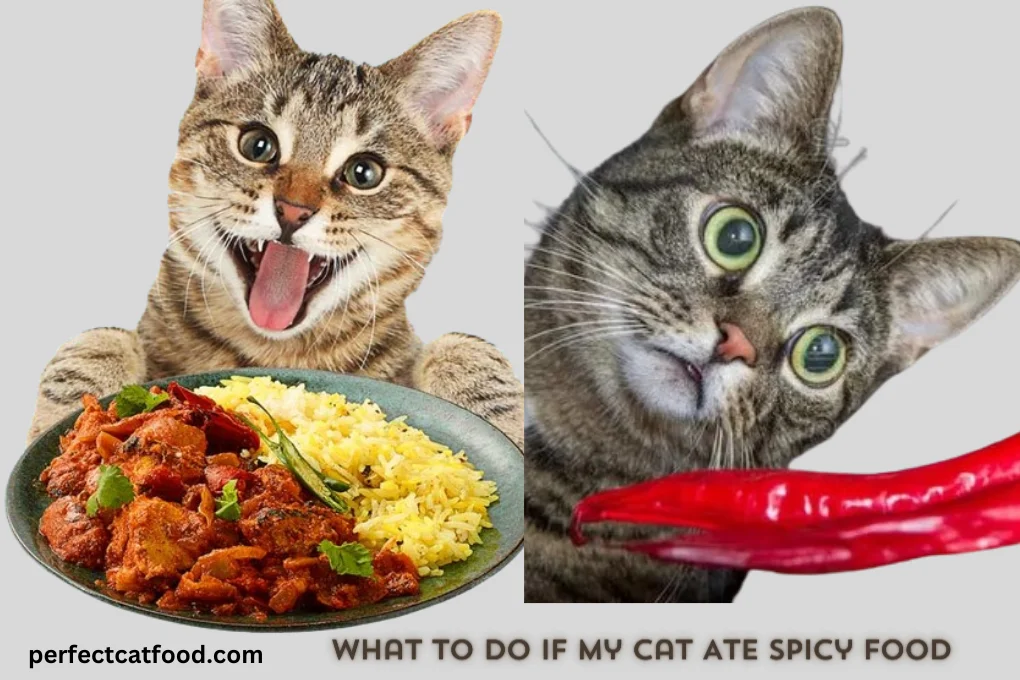What to Do If My Cat Ate Spicy Food? If your cat ate spicy food, don’t panic. As a responsible cat owner, it’s essential to be aware of the potential dangers and know how to handle such situations.
If your cat has eaten spicy food, give them plenty of water as a first aid. You can give them bland food or plain yoghurt if they have trouble drinking water.
In this article, I’ll explore the signs that your cat may have eaten spicy food, what to do immediately, what are the home remedies for mild cases, when to seek professional help, and how to take preventative measures to ensure it doesn’t happen again. I will discuss this.
Table of Contents
What to do if my cat ate spicy food?
Let’s delve deeper into each of the steps:
Monitor your cat
Keep a watchful eye on your cat’s behavior. Look for signs of discomfort, such as excessive drooling, pawing at the mouth, restlessness, or any unusual behavior.
Cats may not always show immediate symptoms, so observe them for a period to ensure no delayed reactions.
Provide water
Ensure your cat has access to clean and fresh water. Spicy foods can be irritating, and water helps to dilute the spices and alleviate any discomfort.
Some cats may not drink water willingly, so you can try using a syringe (without the needle) to squirt water into their mouth gently.

Offer bland food
Introduce bland, easily digestible food to soothe your cat’s stomach. Boiled chicken or plain rice are good options.
Start with small portions to prevent overloading the digestive system. If your cat refuses to eat, give them time before trying again.
Avoid giving milk
Contrary to popular belief, milk is not a suitable remedy for spicy food ingestion in cats. Many adult cats are lactose intolerant, and milk can lead to digestive upset.
Stick to water as the primary fluid to keep your cat hydrated.
Consult your veterinarian
If your cat’s symptoms persist or worsen, or you notice signs of severe distress such as prolonged vomiting, diarrhoea, lethargy, or apparent pain, contact your veterinarian immediately.
Provide details about the type and amount of spicy food ingested and any observed symptoms. Your vet may recommend specific steps based on your cat’s health history.
Signs Your Cat Ate Spicy Food
If your cat has ingested spicy food, there are several signs you might observe. Cats have different tolerances and reactions to spicy substances, so the severity of symptoms can vary.
Here are common signs that your cat may have eaten spicy food:
Excessive Drooling
Spicy foods can irritate, leading to increased salivation. If you notice your cat drooling more than usual, it might be a sign of ingestion of something spicy.
Pawing at the Mouth
Cats might paw at their mouths or faces if they’ve consumed something irritating. This behavior could indicate discomfort or an attempt to remove the taste.
Restlessness or Agitation
Cats may become restless or agitated if they experience digestive discomfort. They might pace, meow more than usual, or exhibit other signs of distress.
Vomiting
Spicy foods can upset a cat’s stomach, leading to vomiting. If you observe your cat vomiting repeatedly, it could be a response to the spiciness.
Diarrhea
Digestive upset from spicy foods may also manifest as diarrhea. Keep an eye on your cat’s litter box habits and note any changes in stool consistency.
Lack of Appetite
Cats may lose their appetite or refuse to eat if they’ve ingested something that doesn’t agree with them. A sudden change in eating habits could be a sign of digestive distress.
Licking or Chewing Behavior
Cats may lick or chew on objects, surfaces, or themselves in response to a spicy taste lingering in their mouths.
Lethargy
If the spiciness has caused significant distress, your cat might become lethargic or less active than usual.
Hiding
Cats often seek out hiding spots when they feel unwell. It could be a sign of discomfort if your cat retreats to an unusual or secluded location.
Visible Discomfort
Watch for any signs of discomfort, such as vocalizations, changes in posture, or a hunched appearance.
If you observe any of these signs and suspect your cat has ingested spicy food, monitoring them closely is important.
If the symptoms persist or worsen, or you notice severe signs of distress, contact your veterinarian promptly for guidance and professional assistance.
Treatment of Spicy Food Ingestion in Cats
Don’t panic if your feline friend accidentally eats spicy food. Stay calm to assess the situation.
Provide fresh water for your cat to drink. Hydration helps dilute the spice. Watch for signs of distress like excessive drooling or lethargy.
Avoid giving home remedies without veterinary advice. If symptoms persist or worsen, consult your vet immediately.
How To Prevent Your Cat From Eating Spicy Food Again?
Here are some tips to get your cat off spicy food again:
1. Store Wisely: Keep spicy foods securely stored in closed containers or cabinets outside your cat’s reach.
2. Mind Your Plate: Be mindful of your cat’s curiosity and keep spicy dishes away from their curious paws.
3. Check Ingredients: Scrutinize labels for hidden spices in packaged foods; some can harm your feline friend.
4. Spicy Scraps Beware: Dispose of spicy leftovers properly to avoid tempting your cat with potentially harmful scraps.
5. Educate Yourself: Familiarize yourself with common spices toxic to cats, such as onions, garlic, and chilli peppers.
6. Mealtime Separation: If your cat likes to join you during meals, consider feeding them beforehand to reduce food curiosity.
7. Create Safe Zones: Designate specific areas in your home where spicy foods are prepared and consumed, excluding your cat.
8. Distractions Help: Provide engaging toys or activities to divert your cat’s attention when you’re enjoying spicy dishes.
9. Train with Treats: Use positive reinforcement by rewarding your cat with treats to avoid spicy foods.
10. Consult Your Vet: If your cat shows signs of ingesting spicy food, consult your vet immediately on potential risks and actions.
What do I do if my cat eats garlic?
If your cat consumes garlic, take immediate action, as it harms felines and can lead to severe health problems. Contact your vet immediately for guidance.
Watch for symptoms like vomiting, diarrhea, lethargy, or difficulty breathing. Provide your vet with details about the amount of garlic ingested and your cat’s weight.
Don’t wait for symptoms to worsen. Do not attempt home remedies without professional advice. Timely intervention is crucial to your cat’s well-being.
Can Cats Die From Spicy Food?
Yes, cats can be harmed by spicy food, which can lead to death in extreme cases. Spicy foods often contain onions or garlic, which are toxic to cats.
Additionally, the intense flavors can upset their stomach and cause digestive issues. Some spices, such as chilli peppers, may cause irritation or damage a cat’s digestive system.
Always avoid feeding spicy foods to cats and stick to a diet that is safe and suitable for their digestive system.
If you suspect your cat has ingested spicy food and shows signs of distress, consult a vet immediately.
FAQs About Cats and Spicy Food
Can I give my cat a small amount of spicy food?
It’s not recommended. Cats have a low tolerance for spicy foods, and even a small amount can cause digestive issues.
How do I know if my cat is lactose intolerant?
Watch for signs like diarrhea or abdominal discomfort after consuming dairy products.
Are there any spices that are safe for cats?
While some herbs are safe, sticking to cat-specific treats is best to avoid potential risks.
Can spicy food cause long-term health problems for cats?
Prolonged exposure to spicy foods can contribute to cat digestive issues and other health concerns.
What should I do if my cat refuses to eat after consuming spicy food?
Consult a vet if your cat refuses to eat, as it may indicate underlying issues.
Conclusion
If your cat ate spicy food, don’t panic. While it’s not ideal, cats can tolerate small amounts of spice without problems.
Symptoms to watch for include vomiting, diarrhoea, and excessive thirst.
If your cat has ingested spicy food, swift action is necessary, and consulting with a vet is always the safest approach.
In the meantime, offer your cat plenty of water and a bland diet until they recover.
Understanding the signs, taking immediate steps, and implementing preventive measures can ensure your feline friend stays healthy and happy.

Hi there! My name is Koushik; I am a cat lover. I specialize in writing about pet care & food. I have a wealth of knowledge on cat food niches and related subjects. I have worked in the pet industry for over 5 years and am passionate about helping cat owners provide the best care for their furry friends. With knowledge of cat food and nutrition, I aim to share their insights and help cat owners navigate the world of cat food niches. I enjoy playing with my two cats, reading, and exploring new cat food brands in my free time.
